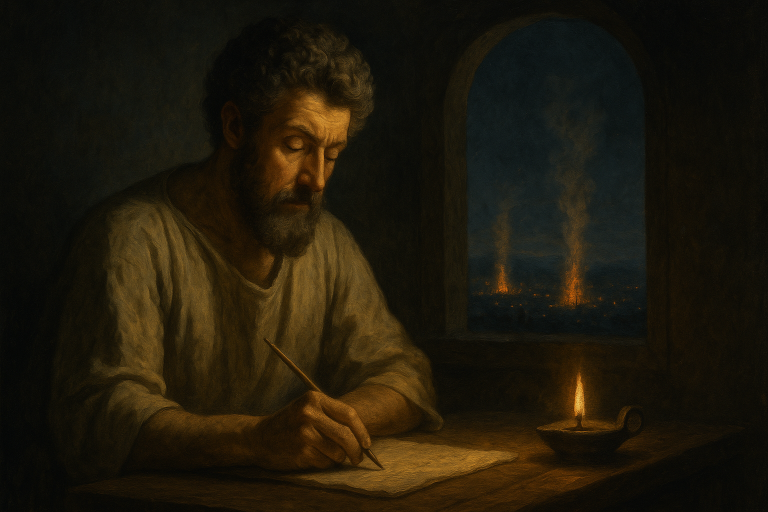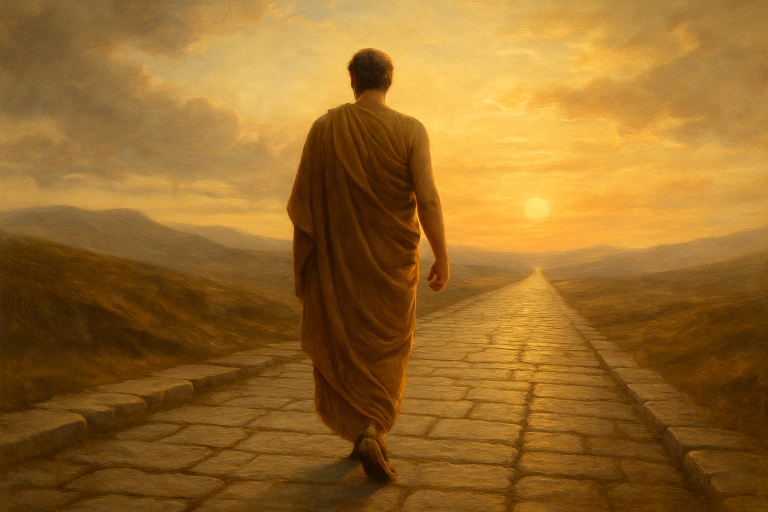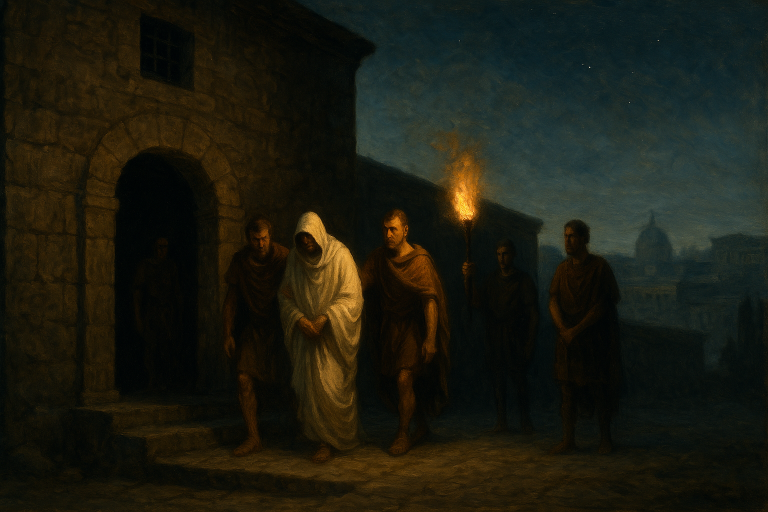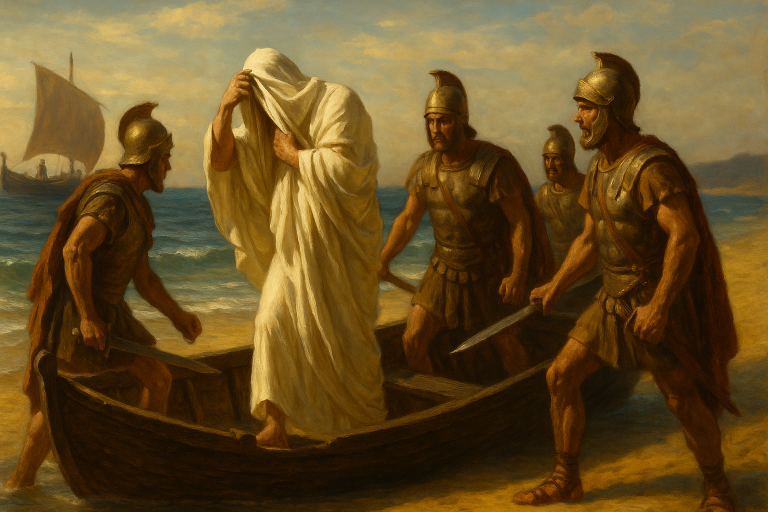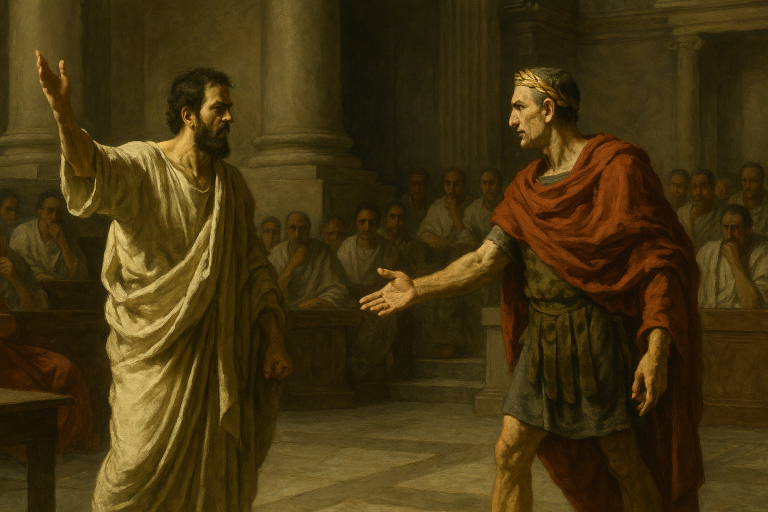The Four Virtues · A Framework for Living Well
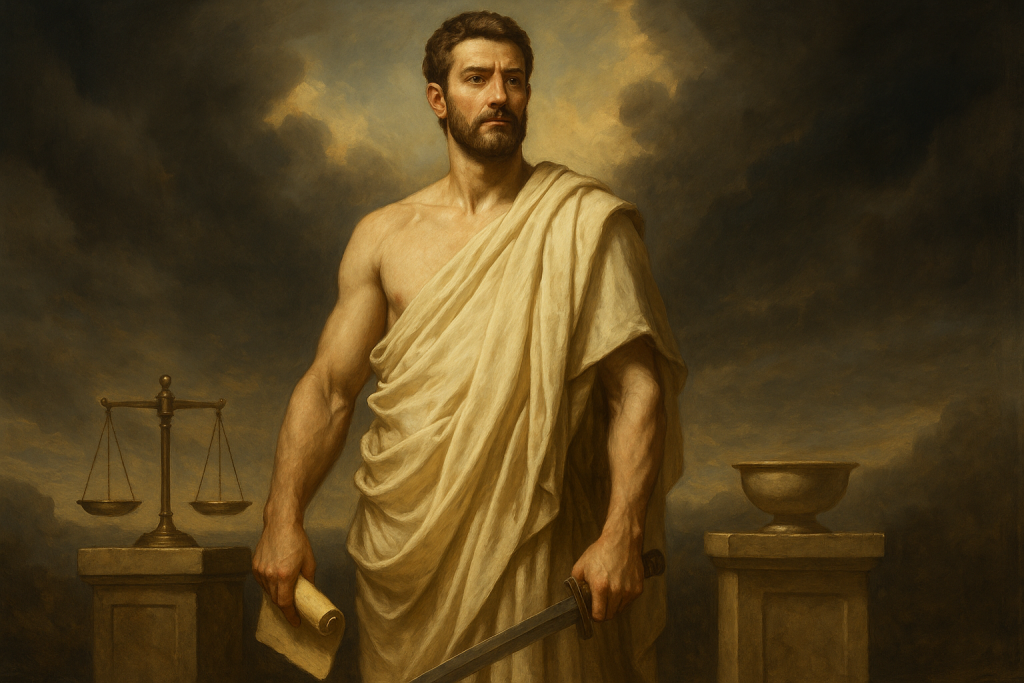
In the spring of 175, Marcus Aurelius marched east with his legions. Rome’s frontiers were unstable, threatened by invasions, rebellions, and plague. He was emperor of the most powerful empire in the world, but also a man worn thin by years of war and loss. Each night, in the quiet of his tent, he took up a wax tablet and tried to remind himself how to live.
He did not write about strategy or politics. He wrote about virtue.
To Marcus, the measure of a man was not how much land he conquered or how many enemies he defeated. Those things were fleeting, outside his control. What remained was the quality of his soul, shaped by wisdom, justice, courage, and temperance. These four virtues—an inheritance from Greek philosophy, refined by the Romans—were the compass he returned to when the world outside was chaos.
Two thousand years later, the world has changed, but the questions have not. What does it mean to live well? What does it mean to act rightly? When the noise of the age pulls us in every direction, what can still anchor us? Marcus found his answer in the Four Virtues. They are no less a guide for us today.
Seeing Clearly in a Clouded World
In the middle of the second century, Marcus Aurelius ruled an empire that stretched from the edge of the Atlantic to the deserts of Mesopotamia. Yet despite this vast dominion, he constantly reminded himself that power did not equal clarity. He wrote that the mind must learn to distinguish what is truly good from what only appears so. Wisdom, for the Stoics, was the ability to see reality without distortion.
This was no easy task in Rome. Senators schemed for influence, generals pursued glory, citizens clamored for entertainment and grain. Every voice claimed urgency. Without wisdom, Marcus risked being swept into the noise, chasing applause or fearing the mob. Instead, he reminded himself that only virtue mattered. A crowd could cheer or curse; fortune could raise him or bring him low. What counted was whether he saw the difference between what lay in his power and what did not.
We face the same difficulty today. Our world brims with voices—social media feeds, news cycles, advertisements—that all insist on importance. The effect is fog. We mistake distraction for knowledge, emotion for clarity. Stoic wisdom cuts through that fog. It asks the simplest question: what is within my control, and what is not?
This was the compass Marcus carried with him on campaign, the lens that kept him steady as disease and war closed in. It remains the first of the Four Virtues because without it, the others falter. Courage without wisdom can become recklessness. Justice without wisdom becomes blind zeal. Temperance without wisdom becomes denial. To see clearly, then, is the beginning of living well.
Living Beyond the Self
In 46 BCE, the Roman Republic was collapsing. Julius Caesar had marched his legions across the Rubicon, seized power in Rome, and crushed his rivals. Many senators bent the knee to survive. Only a handful resisted. Among them was Cato the Younger.
Cato had no illusions about his chances. He could have compromised, preserved his wealth, and lived comfortably under Caesar’s rule. Instead, he chose principle. Justice, for the Stoics, meant duty to others—the refusal to abandon the common good for personal gain. To betray that duty, Cato believed, was to betray himself.
Even Caesar, his enemy, admitted a grudging respect. When he heard of Cato’s death, he remarked, “Cato, I begrudge you your death, as you begrudged me the chance to save your life.” For Cato, justice was not abstract. It was embodied in action, in loyalty to the Republic, in living—and dying—for something larger than himself.
This is the core of Stoic justice: the recognition that we are not isolated beings but citizens of a larger order. Our choices ripple outward, touching family, community, even the generations that follow. Justice demands we consider those bonds before we act.
The temptation in every age is to put the self first—to retreat into comfort, to guard one’s own advantage, to ignore the wider consequences. Cato’s example reminds us that real justice requires sacrifice. It requires seeing the self as part of a whole.
The Republic fell, and Caesar ruled as dictator. Yet Cato’s stand outlasted both. He became the model of unbending principle, proof that justice is not measured by success or survival but by the integrity of one’s choices.
Strength in the Face of Fear
Epictetus was born into slavery in the household of Nero’s secretary. He had no wealth, no freedom, no control over his body. By every measure of Roman society, his life should have been insignificant. Yet from this lowest position he showed what the Stoics meant by courage.
His master once twisted his leg, testing how far he could endure pain. Epictetus warned him calmly: “If you continue, you will break it.” The master kept going. The leg broke. Epictetus did not scream. He simply said, “Did I not tell you so?” That limp remained with him the rest of his life, but so did the lesson: courage is not the absence of suffering, but the refusal to let suffering define you.
When he later gained freedom, Epictetus did not dwell on revenge or bitterness. He taught philosophy. Students traveled across the empire to hear him speak, not because he promised comfort but because he embodied endurance. To him, courage was facing what could not be changed—pain, loss, even death—without surrendering integrity.
Most acts of courage are not played out in front of emperors or armies. They are quiet: speaking truth when it costs you, staying steady when fortune turns, refusing despair when life narrows. Epictetus knew this better than anyone. “You may fetter my leg,” he said, “but not even Zeus has power over my will.”
His life showed that courage is not only for the battlefield or the senate floor. It belongs to anyone who refuses to bow to fear or bitterness. Epictetus proved that even the powerless can be unconquered, that courage is not a privilege of rank but a choice available to every human being.
Restraint as Power
Seneca lived surrounded by wealth. As tutor and advisor to Nero, he accumulated estates, villas, and fortunes that few in Rome could rival. His critics mocked him as a philosopher of moderation who owned more than any Stoic should. And Seneca himself knew the charge was not baseless. He wrote often of his own failings, confessing that luxury tempted him and that his practice fell short of his principles.
Yet this tension is precisely what makes him worth studying. For the Stoics, temperance was not about poverty or renunciation. It was about mastery. To own wealth was not a fault—so long as wealth did not own you. Seneca returned to this point in his letters: the wise man uses fortune without becoming its servant. To indulge every appetite is slavery in disguise. To restrain desire, even while living among abundance, is freedom.
In practice, Seneca tried to discipline himself. He wrote of setting aside days each month to live as if poor, eating coarse bread, drinking water, sleeping without comfort, so that he could remind himself how little was truly necessary. “Is this what I feared?” he asked. By rehearsing poverty, he dulled its sting. By practicing moderation, he kept pleasure from becoming addiction.
Temperance does not attract the same admiration as courage or justice. It is quieter, less dramatic. But without it, the other virtues lose their force. A man without restraint becomes reckless with courage, corrupt with justice, foolish with wisdom. Seneca’s life shows both the difficulty and necessity of temperance. Surrounded by wealth and power, he fought to keep himself free from them. His struggle remains familiar to us today, in a world that dangles indulgence at every turn.
The Four Virtues Together
The Stoics never meant for the virtues to stand alone. Wisdom without courage falters when fear arrives. Courage without justice becomes reckless violence. Justice without temperance turns harsh and unforgiving. Temperance without wisdom can harden into denial. Each virtue strengthens the others, forming not four separate paths but one whole way of living.
The ancients knew this. Marcus Aurelius sought wisdom to cut through confusion, but he needed courage to endure the endless campaigns and griefs of his reign. Cato embodied justice, but without temperance his unbending severity alienated allies and hastened the Republic’s fall. Epictetus showed courage in chains, but it was guided by wisdom and restrained by temperance. Seneca wrestled with wealth, trying to prove that justice and temperance could coexist even in the halls of power. None of them were perfect. Yet together their lives sketch the outline of what the Stoics believed possible: a life built on the harmony of the virtues.
The Romans used the image of a square to describe this kind of life—four equal sides, balanced and unshaken. A man anchored in the Four Virtues could withstand fortune’s storms. He might lose wealth, suffer pain, face exile or death, but he would not lose himself.
That was the promise of Stoicism: not escape from hardship, but a framework for meeting it with integrity. The Four Virtues remain as practical now as they were in Rome. They are not relics of philosophy but tools for daily decisions, the measure of whether we act rightly in a world that tempts us otherwise.
To live well is not to chase every desire, nor to avoid every danger. It is to live with clarity, fairness, courage, and restraint. It is to live, as the Stoics said, in accordance with virtue—and thus, in accordance with nature itself.

